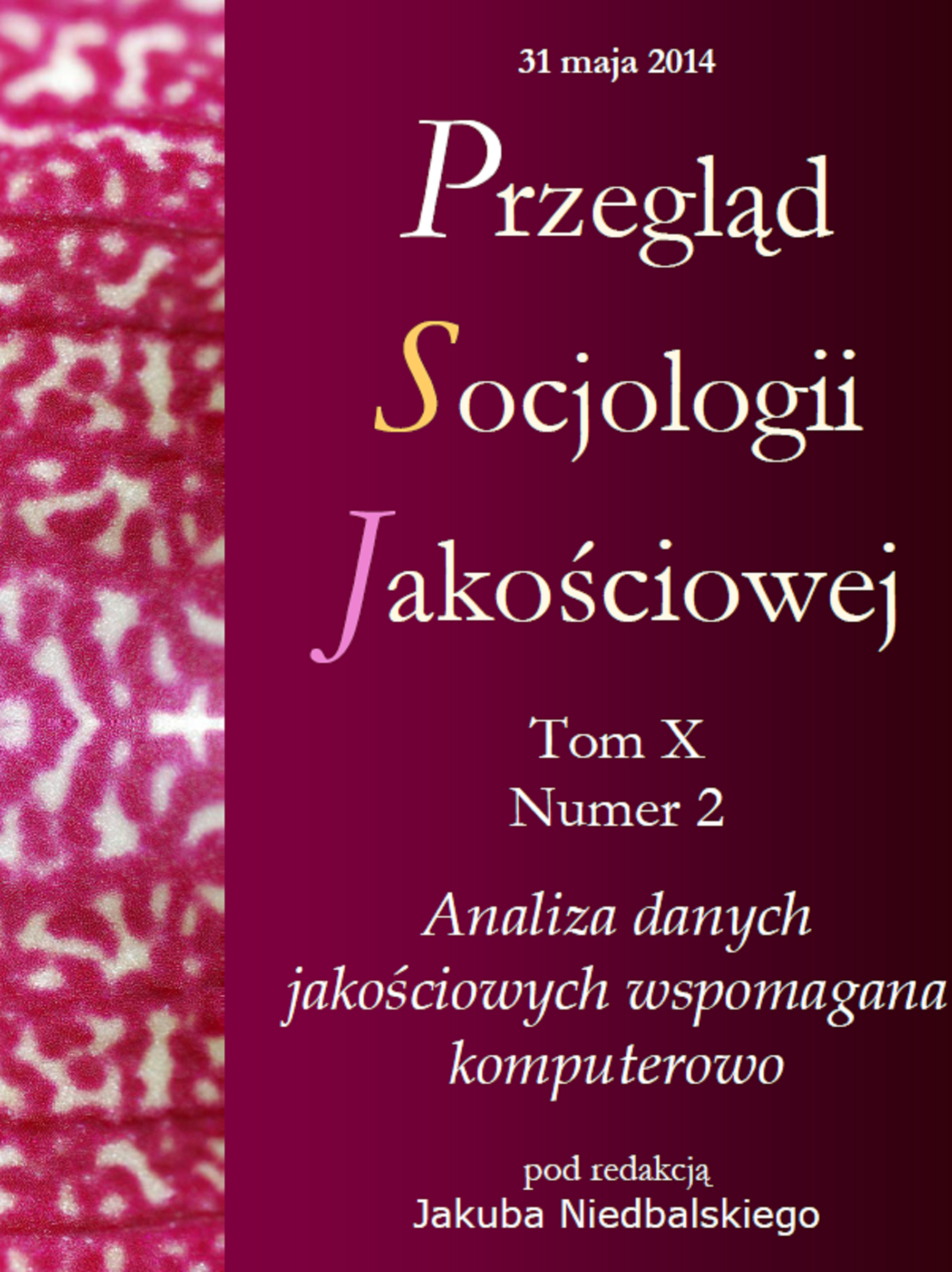Usage of Software Packages R and RQDA in a Qualitative-Quantitative Content Analysis of Verdicts of Polish Constitutional Tribunal
DOI:
https://doi.org/10.18778/1733-8069.10.2.08Keywords:
CAQDA, RQDA, R (software), content analysis, intercoder reliability, Polish Constitutional TribunalAbstract
The paper describes utilization of R statistical software with RQDA CAQDA package in a mixed qualitative-quantitative triangulated content analysis with free coding, intercoder reliability analysis, and statistical significance analysis, performed on a sample of justifications of verdicts of Polish Constitutional Tribunal, issued between 1986 and 2009. It presents the most important features of software used, assumptions of the study, its methodology and procedures of data analyses, as well as epistemic questions which arose in the course of its execution.
Downloads
References
Alexy Robert (1985) Theorie der Grundrechte. Baden-Baden: Nomos.
Google Scholar
Alexy Robert (1996) Theorie der juristischen Argumentation: Die Theorie des rationalen Diskurses der juristischen Begriffs. Frankfurt am Main: Suhrkamp.
Google Scholar
Campbell John L. i in. (2013) Coding In-Depth Semistructured Interviews: Problems of Unitization and Intercoder Reliability and Agreement. „Sociological Methods and Research”, vol. 42(3), s. 294–320.
Google Scholar
DOI: https://doi.org/10.1177/0049124113500475
Carey James W., Morgan Mark, Oxtoby Margaret J. (1996) Intercoder Agreement in Analysis of Responses to Open-Ended Interview Questions: Examples from Tuberculosis Research. „Cultural Anthropology Methods”, vol. 8(3), s. 1–5.
Google Scholar
DOI: https://doi.org/10.1177/1525822X960080030101
Carey James W. i in. (2004) Reliability in Coding Open-Ended Data: Lessons Learned from HIV Behavioral Research. „Field Methods”, vol. 16(3), s. 307–331.
Google Scholar
DOI: https://doi.org/10.1177/1525822X04266540
Feteris Eveline T. (1999) Fundamentals of Legal Argumentation: a Survey of Theories on the Justification of Judicial Decisions. Hague: Kluwer.
Google Scholar
DOI: https://doi.org/10.1007/978-94-015-9219-2
Galligan Denis J., Matczak Marcin (2005) Strategie orzekania sądowego o wykonywaniu władzy dyskrecjonalnej przez sędziów sądów administracyjnych w sprawach gospodarczych i podatkowych. Warszawa: Ernst & Young.
Google Scholar
Garfinkel Harold (2007) Studia z etnometodologii. Przełożyła Alina Szulżycka. Warszawa: Wydawnictwo Naukowe PWN.
Google Scholar
Huang Ronggui (2012) RQDA: R-Based Qualitative Data Analysis [dostęp 28 września 2013 r.]. Dostępny w Internecie http://rqda-.r-forge.r-project.org
Google Scholar
Kelsen Hans (2009) Istota i rozwój sądownictwa konstytucyjnego. Przełożył Bolesław Banaszkiewicz. Warszawa: Trybunał Konstytucyjny.
Google Scholar
Krippendorff Klaus (2004a) Content Analysis An Introduction to Its Methodology. Thousand Oaks: Sage.
Google Scholar
Krippendorff Klaus (2004b) Reliability in Content Analysis: Some Common Misconceptions and Recommendations. „Human Communication Research”, vol. 30(3), s. 411–433.
Google Scholar
DOI: https://doi.org/10.1093/hcr/30.3.411
Krippendorff Klaus (2008) Testing the Reliability of Content Analysis Data [w:] Krippendorff Klaus, Bock Mary Angela, eds., The Content Analysis Reader. Thousand Oaks: Sage, s. 350–357.
Google Scholar
Kurasaki Karen S. (2000) Intercoder Reliability for Validating Conclusions Drawn from Open-Ended Interview Data. „Field Methods”, vol. 12, s. 179–194.
Google Scholar
DOI: https://doi.org/10.1177/1525822X0001200301
Latour Bruno (2010) The Making of Law: An Ethnography of the Conseil d’Etat. Cambridge: Polity Press.
Google Scholar
Lautmann Rüdiger (1972) Justiz – Die Stille Gewalt. Frankfurt am Main: Suhrkamp.
Google Scholar
Lombard Matthew, Snyder-Duch Jennifer, Campanella Bracken Cheryl (2002) Content Analysis in Mass Communication Assessment and Reporting of Intercoder Reliability. „Human Communication Research”, vol. 28(4), s. 587–604.
Google Scholar
DOI: https://doi.org/10.1111/j.1468-2958.2002.tb00826.x
Maravall Jose Maria (2003) The Rule of Law as a Political Weapon [w:] Przeworski Adam, Maravall José María, eds., Democracy and Rule of Law. Oxford: Oxford University Press, s. 261–301.
Google Scholar
DOI: https://doi.org/10.1017/CBO9780511610066.012
Morawski Lech (2010) Zasady wykładni prawa. Toruń: TNOiK „Dom Organizatora”.
Google Scholar
Neuendorf Kimberly A. (2002) The Content Analysis Guidebook. Thousand Oaks: Sage.
Google Scholar
R Core Team (2012) R: A Language and Environment for Statistical Computing [dostęp 28 września 2013 r.]. Dostępny w Internecie http://www.R-project.org
Google Scholar
Ripley Brian D. (2001) The R Project in Statistical Computing, „MSOR Connections. The Newsletter of the LTSN Maths, Stats & OR Network”, vol. 1(1), s. 23–25.
Google Scholar
DOI: https://doi.org/10.11120/msor.2001.01010023
Sadurski Wojciech (2008) R ights b efore C ourts: A Study o f C onstitutional Courts in Postcommunist States of Central and Eastern Europe. Dordrecht: Springer.
Google Scholar
Scheffer Thomas (2010) Adversarial Case Making. An Ethnography of English Crown Court Procedure. Leiden: Brill.
Google Scholar
DOI: https://doi.org/10.1163/ej.9789004187269.i-284
Stawecki Tomasz, Winczorek Jan, red., (w druku) Wzorce wykładni konstytucji w Polsce i państwach Europy Środkowej – doktryna i praktyka. Warszawa: Wolters Kluwer.
Google Scholar
Stone Sweet Alec (1999) Judicialization and the Construction of Governance. „Comparative Political Studies”, vol. 32(2), s. 147–184.
Google Scholar
DOI: https://doi.org/10.1177/0010414099032002001
Winczorek Jan, Stawecki Tomasz, Staśkiewicz Wiesław (2008) Between Polycentrism and Fragmentation: The Impact of Constitutional Tribunal Rulings on the Polish Legal Order. Warszawa: Ernst & Young.
Google Scholar
Wronkowska Sławomira (2008) Kilka uwag o „prawodawcy negatywnym”. „Państwo i Prawo”, t. 64(10), s. 5–21.
Google Scholar
Wróblewski Jerzy (1988) Sądowe stosowanie prawa. Warszawa: PWN.
Google Scholar
Wyrembak Jarosław (2009) Zasadnicza wykładnia znamion przestępstw: pozycja metody językowej oraz rezultatów jej użycia. Warszawa: Wolters Kluwer.
Google Scholar
Zieliński Maciej (2008) Wykładnia prawa: zasady, reguły, wskazówki. Warszawa: LexisNexis.
Google Scholar
Downloads
Published
How to Cite
Issue
Section
License

This work is licensed under a Creative Commons Attribution-NonCommercial-NoDerivatives 4.0 International License.














